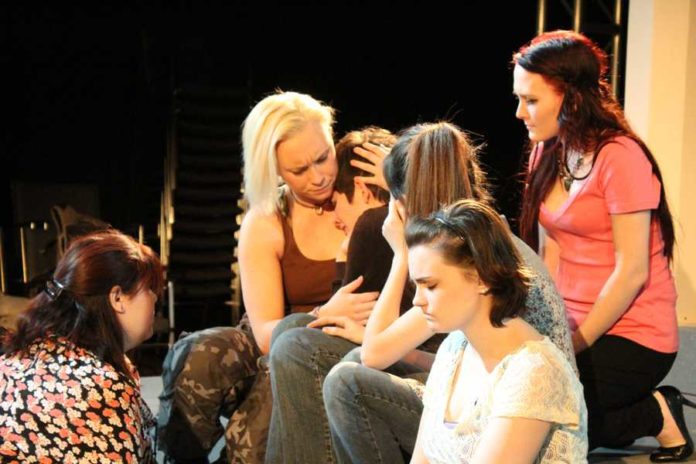With films like Animal House, Revenge of the Nerds and Party Animal, partying has always been associated with college. What those films do not mention is the definition of consent and how the consumption of alcohol can eliminate someone’s ability to consent to sex.
In the upcoming production of Spring Harvest opening on Friday, Feb. 27, written by T.S. Frank and directed by Laura Smiley, an associate professor in the theatre department, the topic of sexual assault in a college atmosphere is touched on, but in a relatable way.
“The play is about two very likeable, personable people that both have one night that changes them and the campus community,” explained Smiley.
According to Smiley, sexual assault and alcohol on a college campus has been a long ongoing issue not only on Slippery Rock’s campus, but also on campuses across the country for generations.
“As women, we live in a rape culture, but we live in a ‘he said, she said’ environment,” Smiley said.
According to Smiley, it is up to the director to interpret the meaning of a script, and she wanted the audience to think for themselves and determine who was right and wrong in the situation.
“There are two sides to every story, and I want the audience to decide who they believe,” Smiley said.
The main conflict of the play takes place between two people in a relationship at a Greek mixer.
“Fraternities and sororities from Slippery Rock came and talked to the cast, and acted as consultants for the production to give us an idea about the reality of Greek Life,” Smiley stated.
According to Smiley, Greek life is not just about partying, and they have a more complex bond then other organizations. Between the bigs, littles and cliques, Greek life is like a microcosm, or a small world with many connections.
“The Greek party is more of a vehicle for the story, not a commentary on Greek life,” Smiley stated.
For this reason, the cast made sure that they did their research, and made sure the names of the fraternities and sororities weren’t named after real-life ones.
Smiley also worked with Dr. Cindy LaCom from the gender studies department to create panel discussions so the audience can have a discussion about the play.
LaCom also played a role in sharing information with the cast like statistics and facts to help inform them and get a better idea of the back-story of the production.
Freshman theatre major, EJ Christopher, 18, plays Burton, a judicial board member for his character’s fraternity.
“To prepare for the part I went to a party, saw how everyone within the Greek organization interacted with each other.” Christopher said.
Burton is close with a character named Pete, who is the brother that was accused of rape, so the story creates a divide between the complex organizations and also shows the loyalty of the family, Christopher explained.
“I got a sense that the character is not the stereotypical ‘frat boy’,” said Christopher.
When preparing for the characters, it was hard for some of the students because they were similar to the characters that they were portraying and could relate, Smiley explained.
Junior math major, Amanda Ciarkowski, 20, said the personal aspect of the characters made playing the role difficult for her. She plays a nurse in the play, and is also an understudy for the role of Katie.
“Katie hears what happens and then makes a judgment, she is portrayed as a strong character but at times her strength becomes a mask for her vulnerability,” Ciarkowski described.
According to Ciarkowski, when she first read the script, she focused on what she thought happened, but said that she realized that she couldn’t let her own opinions stop her from portraying the character how she was meant to be played.
According to Smiley, having two different students play Katie diversifies the role.
Overall Smiley said that she hopes the production creates a community discussion about consent. She also said she is excited to see how the audiences react to it.
“This production challenges the way that people think about sexual assault, and also shows how men and women can have wildly divergent ideas,” Smiley said.
The play will be performed this Friday through Thursday, March 5 in the University Union’s multipurpose room. Tickets are seven dollars per student and $12 for general admission.








